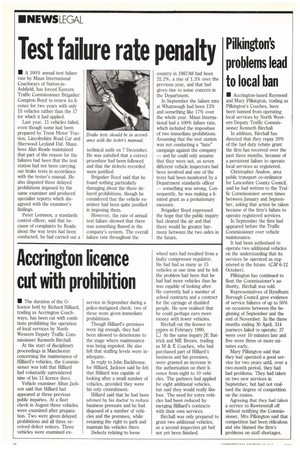Test failure rate penalty
Page 18

If you've noticed an error in this article please click here to report it so we can fix it.
• A 100% annual test failure rate by Maun International Coachways of Sutton-inAshfield, has forced Eastern Traffic Commissioner Brigadier Compton Boyd to renew its licence for two years with only 15 vehicles rather than the 17 for which it had applied.
Last year, 11 vehicles failed, even though some had been prepared by Trent Motor Traction, Lincolnshire Road Car and Sherwood Leyland Daf. Maun boss Alan Reade maintained that part of the reason for the failures had been that the test station had not been carrying out brake tests in accordance with the tester's manual. He also disputed three delayed prohibitions imposed by the same examiner and produced specialist reports which disagreed with the examiner's findings.
Peter Lemmon, a standards control officer, said that because of complaints by Reade about the way tests had been conducted, he had carried out a technical audit on 7 December. He was satisfied that a correct procedure had been followed and that the defects recorded were justified.
Brigadier Boyd said that he found nothing particularly damaging about the three delayed prohibitions, though he considered that the vehicle examiner had been quite justified in imposing them.
However, the rate of annual test failure showed that there was something flawed in the company's system. The overall failure rate throughout the country in 1987/88 had been 22.2%, a rise of 1.3% over the previous year, and that had given rise to some concern in the Department.
In September the failure rate at Whatmough had been 13% and something like 17% over the whole year. Maun International had a 100% failure rate, which included the imposition of two immediate prohibitions. Assuming that the test station was not conducting a "hate" campaign against the company — and he could only assume that they were not, as seven different vehicle inspectors had been involved and one of the tests had been monitored by a Department standards officer — something was wrong. Consequently, he was making a limited grant as a probationary measure.
Brigadier Boyd expressed the hope that the public inquiry had cleared the air and that there would be greater harmony between the two sides in the future.
































































































